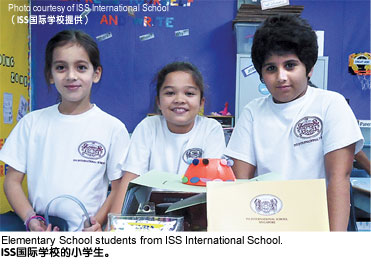 International schools in Singapore come under the purview of the Economic Development Board (EDB) instead of the Ministry of Education (MOE). Clearly, the government sees them as part of the basic infrastructure necessary for economic development. The setting up of such schools is a way of attracting international investment and global talent to Singapore so that it can continue to be the regional headquarters for multinational companies (MNCs).
International schools in Singapore come under the purview of the Economic Development Board (EDB) instead of the Ministry of Education (MOE). Clearly, the government sees them as part of the basic infrastructure necessary for economic development. The setting up of such schools is a way of attracting international investment and global talent to Singapore so that it can continue to be the regional headquarters for multinational companies (MNCs).
At the official launch of the local campus of Dulwich College in February 2013, Mr Leo Yip, Chairman of the EDB, said, “One of the most important factors when global companies consider which city to set up their businesses in is the availability of good quality education for the children of their expatriates. Therefore, in order to attract investment from MNCs to Singapore, we must be equipped with world-class international schools. Even as the global economy as a whole remains uncertain, many global companies continue to invest in and seek growth opportunities in Asia. Singapore is a choice investment destination. The setting up of Dulwich College (Singapore) will aid in attracting more companies to develop their businesses in Singapore.”
A Strategy for Economic Development
Therefore, the setting up of international schools in Singapore is a strategy for economic development.
Singapore has 34 international schools with about 40,000 students, of which the majority are non-locals. Since 2004 MOE has approved the proposals of Hwa Chong Institution, Anglo-Chinese School and St Joseph’s Institution — three local mainstream schools — to set up privately-funded international schools. All three schools received strong support from the EDB, including help to rent premises for their school compound from the government, loans, and approval as an Institution of a Public Character so that donations made to the schools can be exempt from tax.
To allow mainstream schools to set up privately-funded international schools was a suggestion made by former Minister for Education Tharman Shanmugaratnam after the completion of the Review of Junior College and Upper Secondary Education, which he headed. Mr Tharman is now Deputy Prime Minister and Minister for Finance.
Providing More Choice
Mr Tharman said that the setting up of private secondary schools and junior colleges was necessary to provide more choice for the children of expatriates who are stationed in Singapore. These schools, however, must both provide an environment that nurtures the Singaporean spirit and adhere to MOE’s education policies like the bilingual policy and National Education. At least 50 per cent of their student populations will be Singaporeans or Permanent Residents. At the moment, these three local international schools provide a secondary and post-secondary curriculum leading up to the International Baccalaureate. Of the three only St Joseph’s Institution has opened a Primary section which it did in 2008, but St Joseph’s Institution International Elementary School does not fall under MOE’s list of private schools.
Allowing local students to study in international schools does not mean that they will necessarily receive a better education. Instead, the opportunity is given to these students to be in an environment filled with different cultures, to make friends from different parts of the world and to develop understanding and respect for people different from themselves. In an increasingly globalised world, these traits will allow them to become global citizens with the ability to work effectively with people from different cultures.
A Proliferation of International Schools in Asia
Dr Margaret Alvarez, who was the Associate Director of Accreditation with the Council of International Schools from 2003 to 2012, spoke of the two major changes she had observed in her nine years with the organisation. The first was that there had been a proliferation of international schools in Asia, the number of which had grown by 200 to 300 per cent in her estimation. The other trend was that more Asian parents were sending their children to international schools, and these schools were no longer catering solely to the children of expatriates. In Bangkok for example, there are currently more than 120 international schools and a significant proportion of their students come from Thailand itself.
Parents Willing to Invest Large Sums of Money
 “I believe as the world becomes smaller, parents realise that to be successful you have to be able to work with people from other nations. You have to understand cultural differences and be able to negotiate different cultural contexts. Cultural literacy is becoming critical, so that’s why parents are prepared to invest, sometimes lots of money, to have their kids in a context where they’re exposed to different ways of thinking. That’s why there have been many more international schools in Asia, and why they are not affected by the economy,” said Dr Alvarez. “I believe as the world becomes smaller, parents realise that to be successful you have to be able to work with people from other nations. You have to understand cultural differences and be able to negotiate different cultural contexts. Cultural literacy is becoming critical, so that’s why parents are prepared to invest, sometimes lots of money, to have their kids in a context where they’re exposed to different ways of thinking. That’s why there have been many more international schools in Asia, and why they are not affected by the economy,” said Dr Alvarez.
Besides developing students’ cultural literacy, allowing local schools to set up international schools provides a means for our schools to learn from different models of operation in areas like school management, curriculum planning, teacher training, student development and teaching methods. These learning points in turn encourage constant evaluation and improvement in our own system.
In April 2004, when the EDB announced its support for the setting up of private international schools by Hwa Chong Institution and Anglo-Chinese School at a press conference, then Senior Minister of State for Trade and Industry and Minister of State for National Development Vivian Balakrishnan said, “Allowing local schools to set up international schools not only makes for a more colourful educational landscape but provides more choice for both local and international students. These autonomous schools are not restricted by MOE and are therefore able to implement teaching methods which develop students’ entrepreneurship and creativity, becoming pioneers and models for the other schools.”
On the same day, the Managing Director of the EDB, Mr Ko Kheng Hwa, said, “This is the first time Singapore is leveraging on the repute of our top local schools to set up private institutions in order to attract international students to study in Singapore, helping us move towards the goal of becoming a global schoolhouse as a sustainable economic development strategy.”
Hence, setting up international schools in Singapore is not only beneficial for the economy but is also a move that provides opportunities for our local schools to observe, learn, try out, practise, and improve so they may become better.
This issue focuses on international schools, and for it we have interviewed the Principals of all three of our local international schools — Anglo-Chinese School (International), Hwa Chong International School and St Joseph’s Institution International High School. For our coverage of international schools that follow foreign systems, we interviewed the Heads of St Joseph’s Institution International Elementary School, Dulwich College (Singapore), ISS International School, Singapore American School, the United World College of South East Asia and EtonHouse International School. All nine Principals displayed global-mindedness as they spoke about their views and the kind of quality international education they aim to provide for their teachers and students. This issue of EduNation shows that the Singapore government recognises the close link between human and economic development, and is meticulous in the development of both.
Translated by: Lee Xiao Wen
|